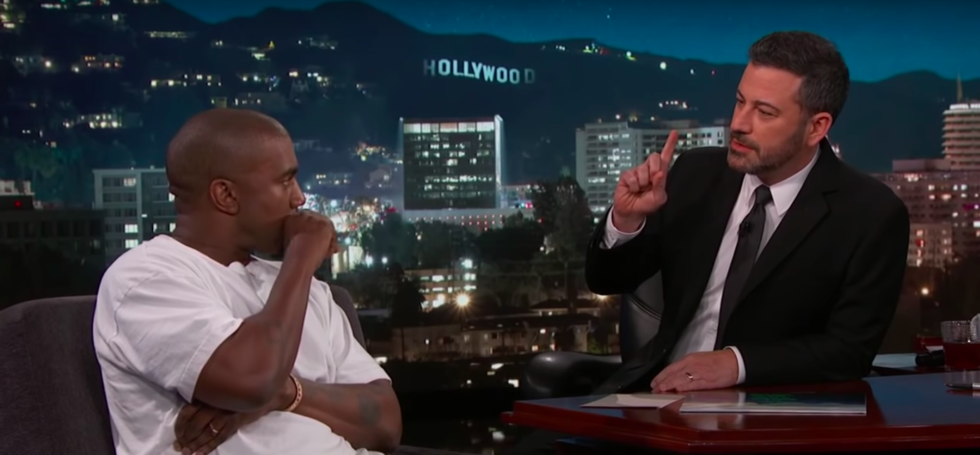In 2005, Kanye West earned a certain infamy after he criticized then-President George W. Bush's response to Hurricane Katrina and the government's failure to help victims of the disaster, saying, “George Bush doesn’t care about black people.” Last night, when Jimmy Kimmel, who had West appear on his show, asked West if President Donald Trump cares about black people "or any people at all," West, one of the president's most high profile supporters, could only sit in silence.
West had, per Kimmel's urging, been asked to explain his support for the president, and he had expressed his hope that “one by one by one we can defuse this nuclear bomb of hate that we’re in as a society by thinking of everyone as our family.”
“I think that’s a beautiful thought, but in literal terms there are families being torn apart at the border of this country,” Kimmel said. “There are literally families being torn apart as a result of what this president is doing. And I think that we cannot forget that, whether we like his personality or not, his actions are really what matter.”
Kimmel then brought up West's comments about President Bush, saying, “I mean, you so famously and so powerfully said, ‘George Bush doesn’t care about black people.’ It makes me wonder what makes you think that Donald Trump does, or any people at all?”
West, arms crossed, sat in silence. Reactions were not particularly kind.
The interview was West's first since he made headlines for declaring that slavery was a "choice" while defending his support for President Trump at the TMZ offices in May.
Earlier during the interview, Kimmel asked West if he believes Trump "is a good president."
West responded with a monologue about “two main motivating factors” in life: “love and fear": The way he explained it, you can still "love" someone even when they do a "bad thing." Rationalizing his support for the president, who has been criticized for harboring racial animus toward African Americans and other minority groups, he said:
Everyone around me tried to pick my candidate for me. And then told me every time I said I liked Trump that I couldn’t say it out loud or my career would be over, I’d get kicked out of the black community because blacks are supposed to have a monolithic thought, we can only be Democrats.
He continued, adding:
It took me a year and a half to have the confidence to stand up and put on the hat, no matter what the consequences were. And what it represented to me is nothing about policies, because I’m not a politician like that, but it represented overcoming fear and doing what you felt, no matter what anyone said, in saying, ‘You can’t bully me.’ Liberals can’t bully me, news can’t bully me, the hip-hop community, they can’t bully me. At that point, if I’m afraid to be me, I’m no longer Ye [the name of his new album]. That’s what makes Ye.
Addressing his comments on slavery, West said:
I think people focus too much on the past and focus too much on regret... [I've] heard of history class [but I've] never heard of a future class, so they keep us so focused on history that we start to believe that it actually repeats itself and we become overly traditional. And we can’t advance as a race of beings.Sometimes you just have to be fearless enough to break the fucking simulation.
West's evolution from an active member of the left to Trump supporter has been well-documented, and he has raised more than a few eyebrows for his defense of some of the president's incendiary comments, including back in January, when Trump sparked controversy after he referred to Haiti and African nations as "shithole countries."
"You don't have to agree with trump but the mob can't make me not love him," West wrote at the time, before claiming that he and Trump "are both dragon energy," a statement that has made him an object of mockery more than once.
In April, West claimed that he doesn't "agree with everything Trump does."
West's wife, socialite Kim Kardashian-West, endorsed Hillary Clinton in the 2016 presidential election. She met with Trump several weeks ago and was able to convince the president to agree to grant clemency to a woman who had been held behind bars for decades on drug charges.
















 @JaJa_no_NO/X
@JaJa_no_NO/X @CWMorgan1000/X
@CWMorgan1000/X reply to @spain2323/Instagram
reply to @spain2323/Instagram reply to @spain2323/Instagram
reply to @spain2323/Instagram reply to @spain2323/Instagram
reply to @spain2323/Instagram reply to @spain2323/Instagram
reply to @spain2323/Instagram reply to @spain2323/Instagram
reply to @spain2323/Instagram reply to @spain2323/Instagram
reply to @spain2323/Instagram reply to @spain2323/Instagram
reply to @spain2323/Instagram reply to @spain2323/Instagram
reply to @spain2323/Instagram reply to @spain2323/Instagram
reply to @spain2323/Instagram reply to @spain2323/Instagram
reply to @spain2323/Instagram reply to @spain2323/Instagram
reply to @spain2323/Instagram reply to @spain2323/Instagram
reply to @spain2323/Instagram reply to @spain2323/Instagram
reply to @spain2323/Instagram reply to @spain2323/Instagram
reply to @spain2323/Instagram reply to @spain2323/Instagram
reply to @spain2323/Instagram reply to @spain2323/Instagram
reply to @spain2323/Instagram